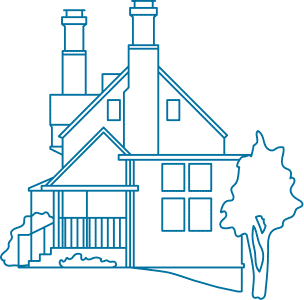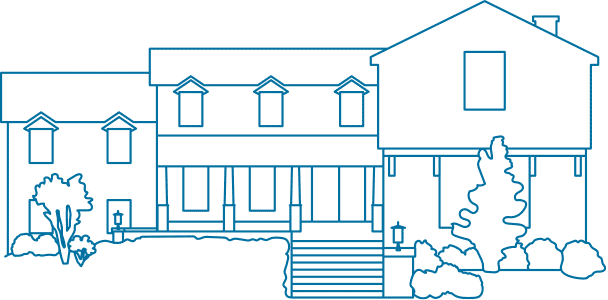Bipolar Disorder
Overview & Clinical Expertise
Silver Hill is among the top bipolar private treatment centers, offering comprehensive and intensive therapy to reduce your symptoms, improve relationships, and build skills for independent living. There are several types of Bipolar Disorder, and some who suffer from it may also show symptoms with psychotic features. Diagnoses may also include co-occurring disorders like substance abuse, requiring expert and simultaneous treatment.
Although there is no cure for bipolar disorder, your symptoms can be managed with treatment at Silver Hill. We start with a careful diagnosis and treatment plan that is specific to you.
Our highly trained and experienced clinicians will seek to clearly understand the issues you face: Do you have bipolar disorder or something else? If you have bi-polar, what type and how does it impact you? Do you have a co-occurring condition that contributes to the impact of bi-polar on your life? What treatment will you best respond to, with the goal of returning you to a meaningful life?
From there, our treatment usually consists of a combination of medication, psychotherapy and regular meetings with a board-certified psychiatrist, who will help guide you through this opportunity to heal and reconnect.
Transitional Living Houses
As an adult patient for Bipolar Disorder or Bipolar Disorder with Psychotic Features in the Transitional Living Program, you may be treated at River House, Barrett House, The Lodge, or another residence appropriate to your symptoms and clinical needs.



Treatments & Therapies
Bipolar Disorder is a complex disease requiring the custom application of evidence-based therapies and medication management to find the most effective combination for you. There are three levels of care corresponding to the level of your needs:
- Inpatient – The goals of this level of care are diagnostic assessment, crisis stabilization, medication management and symptom reduction. The inpatient program at Silver Hill offers a high clinician-to-patient ratio so you can receive the individual attention you require, and be prepared for subsequent levels of care.
- Transitional Living – After inpatient stabilization you may choose to enter our Transitional Living Program, where you reside on campus for a minimum of six weeks and focus on cognitive remediation, psychosocial rehabilitation and medication management. You may be assigned to either River House or The Lodge for treatment, depending on our clinicians assessment of which unit is the best fit for you and the mix of symptoms you experience.
- Intensive Outpatient – There are several Intensive Outpatient Programs available for patients with Bipolar Disorder who are well enough to continue treatment and skills-building from home. Your clinician will recommend the program that best suits your individual symptoms.
The therapies our clinicians may use to treat your bipolar disorder include:
- Dialectical Behavioral Therapy (DBT) – A highly-structured form of behavioral therapy that provides you with the skills necessary to regulate emotions. Learn More about DBT.
- Cognitive Remediation Therapy (CRT) – A computer-based therapy developed by Silver Hill in collaboration with the Department of Psychiatry at Yale University School of Medicine to increase your attention, focus and motivation.
- Pharmacologic Therapies – The use of medications in the treatment of mental health disorders.
- Cognitive Behavioral Therapy (CBT) – A goal-oriented therapy that focuses on identifying and changing damaging patterns of thought and behavior. Learn More about CBT.
- Psychosocial Skills Training – Training in behavioral techniques aimed at enabling patients with serious mental disorders to manage the negative effects of their disorder and function independently in their communities.
Co-Occurring Disorders
Because Silver Hill is multidisciplinary psychiatric hospital, we are uniquely qualified to provide comprehensive care for patients who need treatment for more than one disorder.
We find that one or more of these psychiatric conditions may co-occur with Bipolar Disorder, and require simultaneous treatment:
Patient Experience
When you come to Silver Hill for treatment of Bipolar Disorder, you can expect a safe environment designed to promote healing and recovery. There are three levels of treatment corresponding to patient need:
Inpatient Care – a first, stabilizing step in the recovery from mental illness or addiction
Our Main House Inpatient Service takes place at the Patricia Regnemer Main House building. You will be assigned according to your diagnosis and the type of inpatient treatment that is best suited to assist in your recovery.
The average length of stay varies by diagnosis, ranging from 5 to 12 days. Inpatient units are locked for your safety and no personal computers or cellphones are permitted.
In this safe, supportive environment, you are able to explore:
- Problem solving
- Relapse prevention
- Managing emotions
- Self-esteem
- Coping ahead
- Health and medication education
- Communication skills
- Stress management
All inpatient units are locked for your safety and no personal computers or cellphones are permitted. Visits from family are permitted during scheduled visiting hours.
Your 14-hour day includes:
- Breakfast, lunch and dinner
- Group therapy, including psychoeducational and skills groups
- Medication education
- Twelve-Step work, when appropriate
- Psychopharmacology
- Family program
- Recreational activities
- Nutritional consultation, when clinically indicated
- Cognitive Behavioral Therapy
- Dialectical Behavior Therapy
- Visiting Hours (Family members 12 years of age and older)
Your stay will include daily meetings with your psychiatrist and social worker.
Weekly Al-Anon meetings are also available on campus. Check the Events Calendar for meeting dates and times.
Transitional Living Program for Patients with Bipolar Disorder (Without Psychotic Features) –for continued therapeutic recovery
- After inpatient stabilization you may choose to enter our Transitional Living Program, where you reside on campus for a minimum of six weeks (minimum should be 4 weeks) and focus on customized treatments such as as DBT, DBT-S, cognitive remediation, psychosocial rehabilitation and medication management. You may be assigned to either River House, Barrett House or The Lodge for treatment, depending on our clinicians assessment of which unit is the best fit for you and the mix of symptoms you experience.
The house has a large living room with a kitchen/dining area that opens onto a spacious outdoor patio. Rooms in the residence have private baths and accommodate two people. (Private rooms are available at an additional cost.) Visit Being at Silver Hill for additional details.
Your 14-hour day will include:
- Breakfast, lunch and dinner
- Dialectical Behavior Therapy skills training
- Group therapy
- Goal planning
- Mindfulness meditation
- Recovery discussion meetings
- Recreational activities
- Visiting hours
Transitional Living Program for Patients with Bipolar Disorder (With Psychotic Features) – for residential treatment
If your bipolar diagnosis includes psychotic features, you will reside at The Lodge during the six-week Transitional Living Program. The Lodge is a gracious ,white clapboard house that has been newly renovated. All bedrooms have private baths and accommodate two people. (Private rooms are available at an additional cost). Visit Being at Silver Hill for additional details.
Several times a week, residents prepare and eat meals together as a community. A dietitian is available to address weight management issues, and patients with addictions may participate in AA and NA meetings on campus.
Your 14-hour daily schedule includes:
- Breakfast, lunch and dinner
- Group therapy, including psychoeducational and skills groups
- Medication education
- Psychopharmacology
- Psychosocial skills training
- Cognitive Remediation training
- Cognitive Behavioral Therapy
- Recreational activities
- Nutritional consultation, when clinically indicated
- Visiting hours
Intensive Outpatient Programs – for ongoing treatment from home
There are several Intensive Outpatient Programs available for patients with Bipolar Disorder who wish ongoing treatment while living at home. Check with your Silver Hill clinician to determine the right match for you.
Family Participation
We recognize that the entire family can be affected when you suffer from a mental illness. That’s why we encourage your family to meet with members of the your treatment team, and participate in family programs to help them build stability and develop concrete coping strategies.
We offer programs designed to educate your family members about your illness, and to improve family communication and functioning. Weekly Family Forums address coping strategies specific to the your condition. You are encouraged to join Family Forums with family members over 13 years of age.
We also offer DBT education and skills training at the weekly DBT Family Program.
In addition, we host a bi-weekly Psychotic Disorders Family Program. This program provides education, peer support and self-care. Families learn symptom management, early detection of relapse and communication skills.
Wellness Services
Patients may choose to purchase our Wellness Services, which offers a holistic approach to recovery in recognition of the integration of body, mind and spirit. Services include yoga, acupuncture, personal fitness training, meditation and massage therapy. These alternative therapies complement, not replace, traditional medical care. They are most effective when combined with medical treatment to help alleviate symptoms of pain and anxiety. The benefits, both short term and long, help promote a feeling of wellness.

